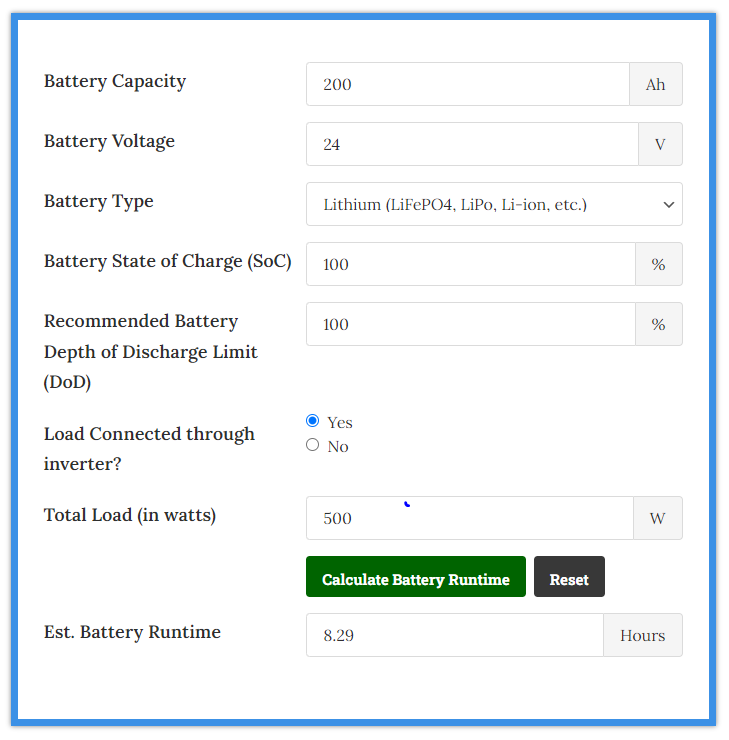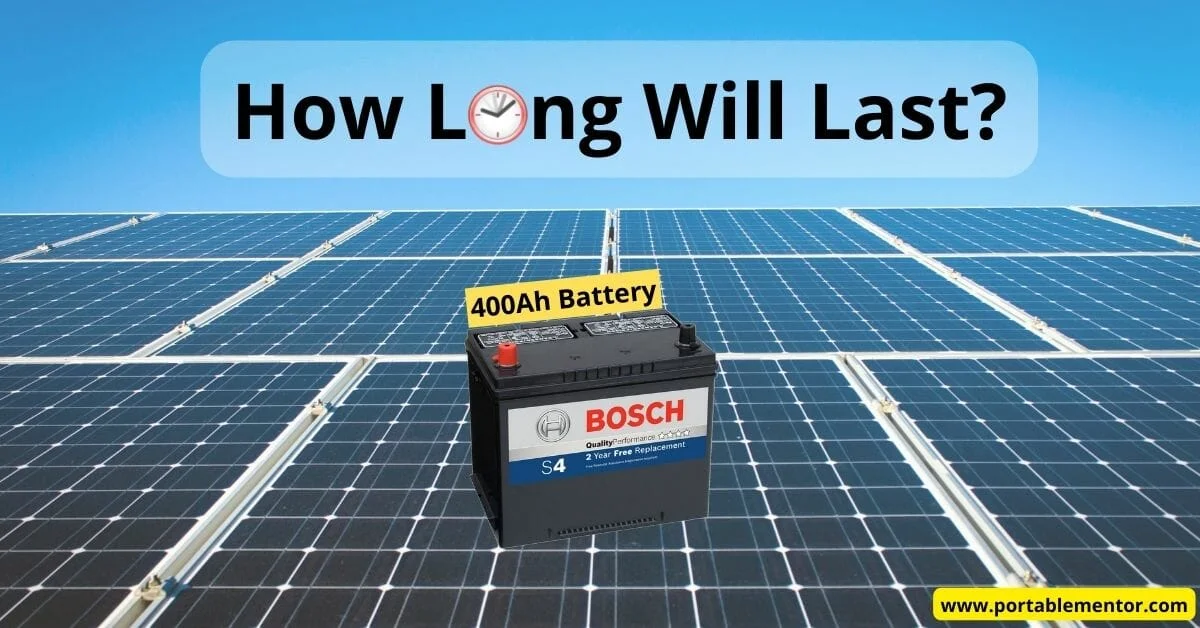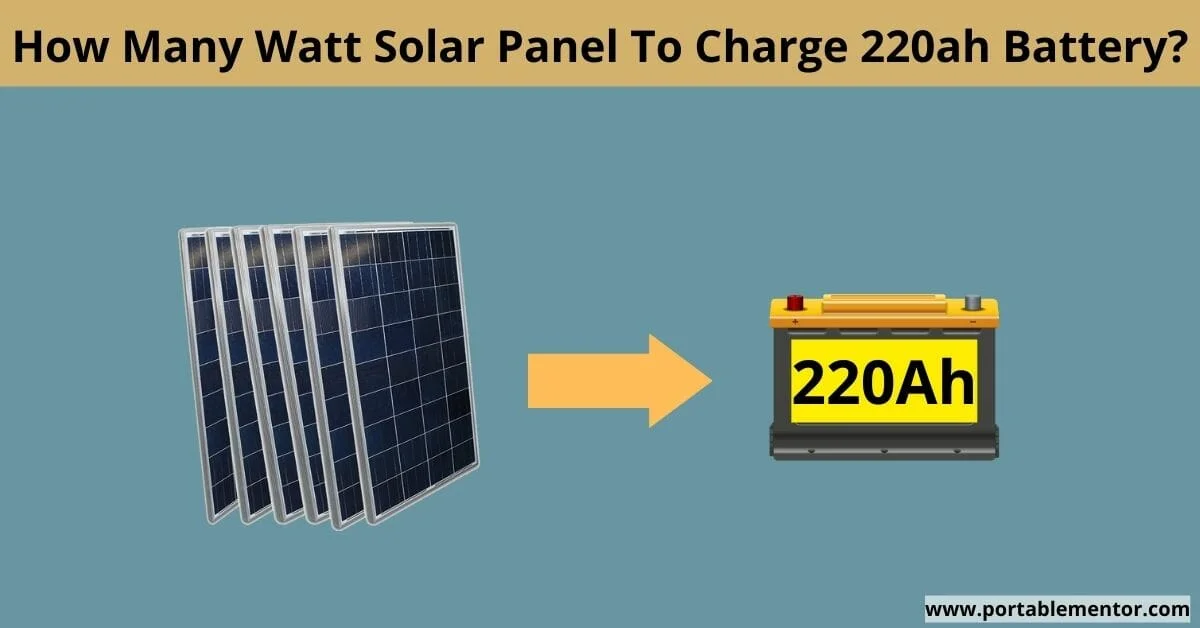Use our battery runtime calculator to find out how long your 24v battery will last on load.
24v battery runtime calculator
Our Calculator Assumptions
- Our 24v battery runtime calculator takes into account battery discharge efficiency (lead acid - 85%, lithium - 95%), and inverter efficiency - 90%.
Limitations of our calculator
- This calculator doesn't take into account the ambient temperature, the effect of discharge rate on battery performance (known as Peukert’s law), and battery age.
Any confusion? Read an in-depth post on our battery runtime calculator to learn more about the DoD and SoC of battery, or keep reading.
Example: how long will a 24v 200ah battery last?
Let's suppose:
- Battery capacity: 200ah
- Battery voltage: 24v
- Battery type: Lithium (LiFePO4)
- Battery state of charge (SoC): 100%, which means a fully charged battery
- Battery DoD limit: 100%, which means you can fully discharge your battery
- Using an inverter? Yes
- Output load: 500 watts

Turns out, a 24v 200ah lithium (LiFePO4) will last about 8 hours running a 500-watt load.
Now, let's discuss some important factors that affect battery discharge time. Let's start by understanding battery capacity in ampere-hours (Ah) and voltage.
What Do Amp-Hours (Ah) And Voltage (V) Mean On A Battery?
Amp-hours (Ah) is a unit of measurement used to describe the capacity of a battery. Precisely, it measures the amount of electrical charge that a battery can deliver over a certain period of time. One amp-hour represents the delivery of one amp of current for one hour.
Voltage (V) is the force that drives electrical current through a circuit. In simple wording --- voltage = pressure.
We measure the total energy in watts. And the formula for watts = voltage × amps.
12V vs 24V battery? a 24v battery can deliver twice the power than a 12v same amp-hour battery. So yes, a 24v battery will last longer than a 12v battery on load.
Lithium batteries last longer than lead acid
Lithium batteries tend to last longer than lead-acid batteries due to several factors.
Here is a chart that compares the chemistry of lead acid and lithium batteries:
| Lithium batteries | Lead acid |
|---|---|
| Lithium batteries offer a higher usable capacity compared to lead-acid batteries since they can be discharged up to 100%. | Lead acid batteries are designed to only be discharged to 50%, which means that you can only get half of the usable power from a same-size lead acid battery as you can from a lithium battery. |
| Lithium batteries experience a decrease in their charge-holding capacity after approximately 2000 cycles. | Lead acid batteries lose their 20% charge-holding capacity after 500 cycles. |
| Lithium batteries have an efficiency rate of approximately 90-95% when discharging, (source). | Lead acid batteries typically have an efficiency of around 80-85% when discharging. |
Affect of Peukert’s law on lead-acid battery performance
Peukert's law is a mathematical equation that describes the relationship between lead-acid batteries' discharge rate and efficiency. It states that the faster a battery is discharged, the less energy it actually has compared to what it's supposed to have.
In simpler terms --- the faster a lead acid battery is discharged, the less energy it will provide compared to its rated capacity.
This happens because of something called "internal resistance" which makes it harder for the battery to work efficiently. When this happens, the battery gets hotter and wears out faster.
Therefore, it's important to choose the right discharge rate for your lead acid battery to ensure maximum efficiency and runtime.
Here's an example of how discharge time affects the usable capacity of 100ah lead acid battery.
| Usable 100ah lead acid battery capacity | Hours of discharge |
|---|---|
| 100ah | 20 hours |
| 90ah | 10 hours |
| 87ah | 8 hours |
| 82ah | 6 hours |
| 80ah | 5 hours |
| 70ah | 3 hours |
| 60ah | 2 hours |
| 50ah | 1 hour |
Please note that this law only applies to lead acid batteries, AGM, and gel battery types.
Affect of ambient temperature on battery performance
The temperature of the environment can greatly affect how batteries perform. Usually, batteries work best at moderate temperatures of around 25°C (77°F). When it gets too hot or too cold, the battery's overall performance, efficiency, and runtime will be affected.
When it's too hot, It increases the battery temperature, resulting in decreased efficiency and capacity.
When it's too cold, the battery's chemical reactions can slow down, leading to decreased efficiency and capacity.
It's crucial to consider the impact of ambient temperature when estimating battery runtime, especially in extreme conditions. A rule of thumb is an increase or decrease in temperature to 77ºF or 25º C can reduce battery performance by 50%.
How long will a 24V battery last with an inverter?
An inverter is necessary to run AC appliances through batteries, as batteries deliver and store power in DC (direct current), while most household appliances require AC (alternating current).
However, it's important to note that most inverters are only about 90% efficient, resulting in a 10% power loss when converting DC to AC.
To calculate how long your 24v battery will last on an inverter, use our previously mentioned calculator. Select "YES" for "Load Connected through an Inverter," and enter your battery information and total load into our calculator.
how long does a 24 volt battery last?
Here's a chart showing how long will a 24v different capacity lead-acid and lithium (LiFePO4) battery will last running a 100 watts of AC load.
| 24v Battery Capacity | Battery Type | Est. Runtime on a 100-watt appliance |
|---|---|---|
| 100ah | Lead-acid | 9 hours |
| 200ah | Lead-acid | 18 hours |
| 300ah | Lead-acid | 28 hours |
| 400ah | Lead-acid | 37 hours |
| 100ah | Lithium (LiFePO4) | 20 hours |
| 200ah | Lithium (LiFePO4) | 40 hours |
| 300ah | Lithium (LiFePO4) | 63 hours |
| 400ah | Lithium (LiFePO4) | 83 hours |
Summary
- 24v lead-acid battery will last anywhere between 10 to 40 hours while running a 100-watt AC load.
- 24v lithium (LiFePO4) battery will last between 20 to 80 hours while running a 100-watt AC load.
How long will a 24v 200Ah battery last
Here's a chart showing how long will 24v 200ah battery will last on load.
| Home Appliance | Power consumption (W) | Estimated runtime (hrs) |
|---|---|---|
| Fridge | 200 watts | 20 hours |
| TV | 50 watts | 83 hours |
| Toaster | 1200 watts | 3.5 hours |
| Computer | 300 watts | 14 hours |
| Ceiling Fan | 60 watts | 69 hours |
| Coffee machine | 800 watts | 5 hours |
| Air purifier | 25 watts | 165 hours |
| Space heater | 1500 watts | 2.5 hours |
| Oven | 2000 watts | 2 hours |
summary
- 24v 200ah lithium battery will last between 2 to 80 hours running different watt appliances. The exact value will depend on the size of the load.
How long will a 24v 100Ah battery last?
Here's a chart showing how long will 24-volt 100ah battery will last on load.
| Home Appliance | Power consumption (W) | Estimated runtime (hrs) |
|---|---|---|
| Fridge | 200 watts | 10 hours |
| TV | 50 watts | 41 hours |
| Toaster | 1200 watts | 1.5 hours |
| Computer | 300 watts | 7 hours |
| Ceiling Fan | 60 watts | 34 hours |
| Coffee machine | 800 watts | 2.5 hours |
| Air purifier | 25 watts | 82 hours |
| Space heater | 1500 watts | 1 hour |
| Oven | 2000 watts | 1 hour |
summary
- 24v 100ah lithium battery will last between 1 to 40 hours running different watt appliances. The exact value will depend on the size of the load.
How long will a 24v 400Ah battery last?
Here's a chart showing how long will 24 volt 400ah battery will last on load.
| Home Appliance | Power consumption (W) | Estimated runtime (hrs) |
|---|---|---|
| Fridge | 200 watts | 40 hours |
| TV | 50 watts | 165 hours |
| Toaster | 1200 watts | 7 hours |
| Computer | 300 watts | 27 hours |
| Ceiling Fan | 60 watts | 138 hours |
| Coffee machine | 800 watts | 10 hours |
| Air purifier | 25 watts | 330 hours |
| Space heater | 1500 watts | 5 hours |
| Oven | 2000 watts | 4 hours |
summary
- 24v 400ah lithium battery will last between 4 to 160 hours running different watt appliances. The exact value will depend on the size of the load.
Related Posts
- What Size Solar Panel To Charge 24v Battery?
- Solar DC Watts To AC Watts Calculator & Formula
- Amps To Watts Calculator: How Many Watts In A 1 Battery?
- Solar Battery Charge Time Calculator
I hope this guide was helpful to you, if you have any queries Contact US thank you!


